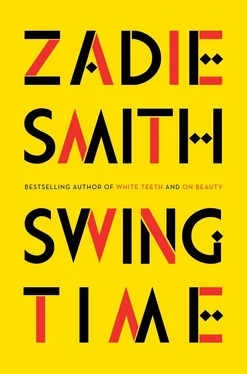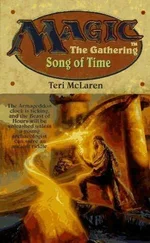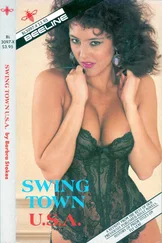“Oh my God, it’s Judy!”
Aimee was across the red damask room, in front of a life-size portrait, laughing. I came up behind and peered at the Van Dyck in question. No doubt about it: there was Judy Ryan, in all her horrible glory, but four hundred years ago, wearing an unflattering black-and-white tent of lace and satin, and with her right hand — half maternal, half menacing — resting on the shoulder of a young, unnamed page. Her bloodhound eyes, terrible fringe, the long, chinless face — it was all there. We laughed so much it seemed to me that something changed between us, some formality or fear fell away, so that when, a few minutes later, Aimee claimed to be charmed by something called The Infant Academy I felt free enough at least to disagree.
“It’s a bit sentimental, isn’t it? And weird…”
“I like it! I like the weirdness. Naked babies painting naked pictures of each other. I’m a sucker for babies right now.” She looked wistfully at a boy child with a coy smirk on his cherubic face. “He reminds me of my baby. You really don’t like it?”
I didn’t know at the time that Aimee was pregnant with Kara, her second child. She probably didn’t know it herself. To me it was obvious the whole picture was ridiculous, and the pink-cheeked infants especially repulsive, but when I looked at her face I saw she was serious. And what are babies, I can remember thinking, if they can do this to women? Do they have the power to reprogram their mothers? To make their mothers into the kinds of women their younger selves would not even recognize? The idea frightened me. I restricted myself to praising her son Jay’s beauty in comparison to these cherubim, not very convincingly or coherently, thanks to the weed, and Aimee turned to me, frowning.
“You don’t want kids, that it? Or you think you don’t want them.”
“Oh, I know I don’t want them.”
She patted me on the top of my head, as if there were not twelve years between us but forty.
“You’re, what? Twenty-three? Things change. I was exactly the same.”
“No, I’ve always known. Since I was little. I’m not the mothering type. Never wanted them, never will. I saw what it did to my mother.”
“What did it do to her?”
To be asked so directly forced me to actually consider the answer.
“She was a young mum, then a single mum. There were things she wanted to be but she couldn’t, not then — she was trapped. She had to fight for any time for herself.”
Aimee put her hand on her hips and assumed a pedantic look.
“Well, I’m a single mom. And I can assure you my baby doesn’t stop me doing a damn thing. He’s like my fucking inspiration right now if you really want to know. It’s a balance, for sure, but you’ve just got to want it enough.”
I thought of the Jamaican nanny, Estelle, who let me into Aimee’s house each morning and then disappeared to the nursery. That there might be any practical divergence between my mother’s situation and her own did not seem to occur to Aimee, and this was one of my earliest lessons in her way of viewing the differences between people, which were never structural or economic but always essentially differences of personality. I looked at the color in her cheeks and where my hands were — out in front of me, like a politician making a point — and realized that our discussion had become rapidly and strangely heated, without either of us really wanting it to, as if the very word “baby” was a kind of accelerant. I put my hands back by my sides and smiled.
“It’s just not for me.”
We headed back through the galleries, looking for the exit, falling in step with a tour guide, he was telling a tale I’d known since childhood, about a brown girl — the daughter of a Caribbean slave and her British master — brought to England and raised in this big white house by well-to-do relatives, one of whom happened to be the Lord Chief Justice. A favorite anecdote of my mother’s. Except my mother did not tell it like the tour guide, she did not believe that a great-uncle’s compassion for his brown great-niece had the power to end slavery in England. I picked up one of the leaflets stacked on a side-table and read that the girl’s father and mother had “met in the Caribbean,” as if they’d been strolling through a beach resort at cocktail hour. Amused, I turned to show it to Aimee but she was in the next room, listening intently to the guide, hovering at the edges of the tour group as if she were part of it. She was always moved by stories that proved “the power of love”—and what difference did it make to me if she was? But I couldn’t help myself, I began channeling my mother, commenting ironically on the commentary, until the guide became irritated and directed his group outside. When we, too, headed for the exit, I took over Aimee’s tour, leading her through a low tunnel of ivy bent into an arbor and describing the Zong as if that great ship were floating right there in the lake right before us. It was an easy image to conjure up, I knew it intimately, it had sailed so many times through my childhood nightmares. On its way to Jamaica, but far off course due to an error in navigation, low on drinking water, filled with thirsty slaves (“Oh?” said Aimee, pulling a briar rose from its bush) and captained by a man who, fearing the slaves would not survive the rest of the journey — but not wanting a financial loss on his first voyage — gathered a hundred and thirty-three men, women and children and threw them overboard, shackled to each other: spoiled cargo on which insurance could later be collected. The famously compassionate great-uncle oversaw that case, too — I told Aimee, as my mother had told me — and he ruled against the captain, but only on the principle that the captain had made a mistake. He, and not the insurers, must take the loss. Those thrashing bodies were still cargo, you could still jettison cargo to protect the rest of your cargo. You just wouldn’t be reimbursed for it. Aimee nodded, tucked the rose she had plucked between her left ear and her baseball cap and knelt suddenly to pat a passing pack of small dogs that were dragging behind them a single walker.
“Whatever doesn’t kill you makes you stronger,” I heard her tell a dachshund, and then, straightening up and facing me again: “If my dad hadn’t died young? No way I’d be here. It’s the pain. Jews, gays, women, blacks — the bloody Irish. That’s our secret fucking strength.” I thought of my mother — who had no patience for sentimental readings of history — and cringed. We left the dogs and walked on. The sky was cloudless, the Heath filled with flowers and foliage, the ponds were golden pools of light, but I couldn’t rid myself of this feeling of discomfort and imbalance, and when I tried to trace its source I found myself back before that unnamed page in the gallery, a little gold ring in his ear, who looked beseechingly up at Judy’s doppelgänger as we’d laughed at her. She did not look back at him, she never could, she’d been painted in such a way as to make that impossible. But hadn’t I also avoided his eye, as I avoided Granger’s eye and he avoided mine? I could see this little Moor now with absolute clarity. It was as if he were standing on the path before me.
• • •
Aimee insisted we end that peculiar afternoon by swimming in the ladies’ pond. Granger waited once more at the gates, three bikes at his feet, angrily turning the pages of his pocket Penguin Machiavelli. A haze of pollen hovered just above the water, it seemed to be caught in the thick, drowsy air, though the water was frigid. I went in cringingly, in my knickers and T-shirt, inching myself down the ladder while two broad-beamed English women in sturdy Speedos and swim caps bobbed nearby, offering unsolicited encouragement to all who were in the process of joining them. (“Really rather nice once you’re in.” “Just keep kicking your legs till you feel them.” “If Woolf swam here, so can you!”) Women to the right and left of me, some three times my age, slipped right off the deck into the water, but I couldn’t get any deeper than my waist and, stalling for time, turned round and pretended instead to be admiring the scene: white-haired ladies moving in a stately circle through the foul-smelling duckweed. A pretty dragonfly dressed in Aimee’s favorite shade of green flitted by. I watched it land on the deck, just by my hand, and close its iridescent wings. Where was Aimee? I had a moment of paralyzing, weed-inflected paranoia: had she got in before me, while I was fretting about my underwear? Already drowned? Tomorrow would I find myself at an inquest, explaining to the world why I let a heavily insured, universally beloved Australian swim unaccompanied in an ice-cold North London pond? A banshee wail pierced the civilized scene: I turned back and saw Aimee, naked, running from the changing room toward me, launching herself in a dive over my head and over the ladder, arms out, back perfectly arched, as if lifted from below by an invisible principal dancer, before hitting the water clean and true.
Читать дальше












